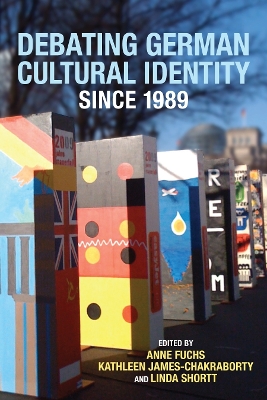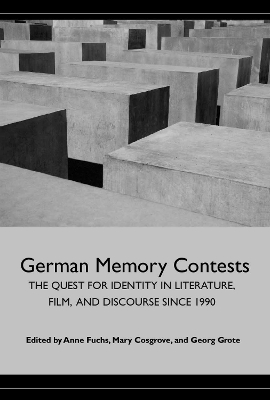Studies in German Literature, Linguistics, and Culture
2 total works
Debating German Cultural Identity since 1989
by Anne Fuchs, Kathleen James-chakrabor, and Linda Shortt
Published 1 January 2011
Interdisciplinary views of the debates over and transformation of German cultural identity since unification.
The events of 1989 and German unification were seismic historical moments. Although 1989 appeared to signify a healing of the war-torn history of the twentieth century, unification posed the question of German cultural identity afresh. Politicians, historians, writers, filmmakers, architects, and the wider public engaged in "memory contests" over such questions as the legitimacy of alternative biographies, West German hegemony, and the normalization of German history. This dynamic, contested, and still ongoing transformation of German cultural identity is the topic of this volume of new essays by scholars from the United Kingdom, Germany, the United States, and Ireland. It exploresGerman cultural identity by way of a range of disciplines including history, film studies, architectural history, literary criticism, memory studies, and anthropology, avoiding a homogenized interpretation. Charting the complex and often contradictory processes of cultural identity formation, the volume reveals the varied responses that continue to accompany the project of unification.
Contributors: Pertti Ahonen, Aleida Assmann, Elizabeth Boa,Peter Fritzsche, Anne Fuchs, Deniz Göktürk, Kathleen James-Chakraborty, Anja K. Johannsen, Jennifer A. Jordan, Jürgen Paul, Linda Shortt, Andrew J. Webber. Anne Fuchs is Professor of German Literature at the University of St.Andrews, Scotland. Kathleen James-Chakraborty is Professor of Art History at University College Dublin, Ireland. Linda Shortt is Lecturer in German at Bangor University, Wales.
The events of 1989 and German unification were seismic historical moments. Although 1989 appeared to signify a healing of the war-torn history of the twentieth century, unification posed the question of German cultural identity afresh. Politicians, historians, writers, filmmakers, architects, and the wider public engaged in "memory contests" over such questions as the legitimacy of alternative biographies, West German hegemony, and the normalization of German history. This dynamic, contested, and still ongoing transformation of German cultural identity is the topic of this volume of new essays by scholars from the United Kingdom, Germany, the United States, and Ireland. It exploresGerman cultural identity by way of a range of disciplines including history, film studies, architectural history, literary criticism, memory studies, and anthropology, avoiding a homogenized interpretation. Charting the complex and often contradictory processes of cultural identity formation, the volume reveals the varied responses that continue to accompany the project of unification.
Contributors: Pertti Ahonen, Aleida Assmann, Elizabeth Boa,Peter Fritzsche, Anne Fuchs, Deniz Göktürk, Kathleen James-Chakraborty, Anja K. Johannsen, Jennifer A. Jordan, Jürgen Paul, Linda Shortt, Andrew J. Webber. Anne Fuchs is Professor of German Literature at the University of St.Andrews, Scotland. Kathleen James-Chakraborty is Professor of Art History at University College Dublin, Ireland. Linda Shortt is Lecturer in German at Bangor University, Wales.
Since unification in 1990, Germany has seen a boom in the confrontation with memory, evident in a sharp increase in novels, films, autobiographies, and other forms of public discourse that engage with the long-term effects of National Socialism across generations. Taking issue with the concept of "Vergangenheitsbewaltigung," or coming to terms with the Nazi past, which after 1945 guided nearly all debate on the topic, the contributors to this volume view contemporary German culture through the more dynamic concept of "memory contests," which sees all forms of memory, public or private, as ongoing processes of negotiating identity in the present. Touching on gender, generations, memory and postmemory, trauma theory, ethnicity, historiography, and family narrative, the contributions offer a comprehensive picture of current German memory debates, in so doing shedding light on the struggle to construct a Germanidentity mindful of but not wholly defined by the horrors of National Socialism and the Holocaust.
Contributors: Peter Fritzsche, Anne Fuchs, Elizabeth Boa, Stefan Willer, Chloe E. M. Paver, Matthias Fiedler, J. J. Long, Dagmar C. G. Lorenz, Cathy S. Gelbin, Jennifer E. Michaels, Mary Cosgrove, Andrew Plowman, Roger Woods.
Anne Fuchs is Professor of Modern German literature and Georg Grote is Lecturer in German history, both at University College Dublin. Mary Cosgrove is Lecturer in German at the University of Edinburgh.
Contributors: Peter Fritzsche, Anne Fuchs, Elizabeth Boa, Stefan Willer, Chloe E. M. Paver, Matthias Fiedler, J. J. Long, Dagmar C. G. Lorenz, Cathy S. Gelbin, Jennifer E. Michaels, Mary Cosgrove, Andrew Plowman, Roger Woods.
Anne Fuchs is Professor of Modern German literature and Georg Grote is Lecturer in German history, both at University College Dublin. Mary Cosgrove is Lecturer in German at the University of Edinburgh.

